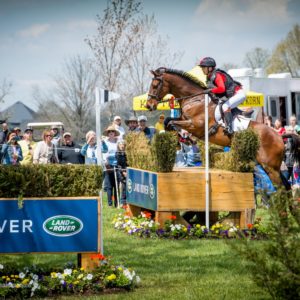
Two years ago, a few members of The University of Florida Equestrian Club decided to start an Eventing Team within the club. They asked me to be their coach. I jumped at the opportunity. I grew up in New Jersey, and I have a BA from Rutgers University in English and theater. I chose Rutgers over other liberal arts universities because it was close to home for me, and that meant that geographically and financially I was able to continue to ride and train while I attended college. I am in the minority as a CCI4* rider in the U.S. that also has a college degree, and I am eternally grateful for the education and life experiences that I gained while at Rutgers. As a coach for the UF Eventing Team, I have been able to support both my sport and younger riders pursuing a liberal arts education.
I have been incredibly impressed over the past two years with the poise and dedication that the kids on the team have exhibited. They show up neat, clean, professional and ready to learn. They come on their lighter days and work in the barn, and many have done internships in the barn for college credit. The team started off with twelve active members in the first year, and then expanded to about sixteen in the second year. Roughly half of the team own their own horses and had already competed in the sport of eventing when they joined. The other half were riders with a decent foundation of skills coming largely from the hunter world who were ready to try something outside of the ring. Although a few of the the higher level team members compete through the upper levels, the bulk of the riders are riding at beginner novice or novice, or even just starting to get into the sport at tadpole.
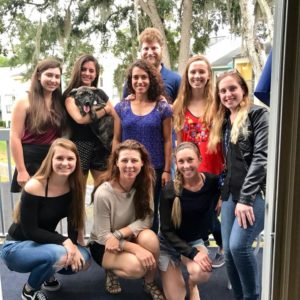
Three day eventing is an incredibly involved sport. It is a triathlon. You have to be proficient in three different styles of riding – dressage, cross country, and show jumping. Not only that, when you compete you have to know the rules for all three phases, and bring things all together over a one or two day period. This winter the Ocala Horse Trials hosted it’s second Intercollegiate Challenge, and we were able to field two teams. In May, we also sent the first UF team to the Intercollegiate Championships in Virginia. In both cases, I was reminded of the many, many bumps that I myself hit along the way as I improved as a rider. At the Ocala Horse Trials, many of the riders did well and were in the ribbons. Some, however, had disappointing weekends. One rider was on a younger horse who was very spooked in show jumping and was eliminated after three refusals. Another rider’s horse was far more excited than she had anticipated and she wasn’t able to manage his speed. She, too, was eliminated in a jumping phase. At the Intercollegiate Challenge in May, two of the riders achieved personal best dressage scores, but of the three team members competing, only one was consistent enough across the weekend to finish on his dressage score and in the ribbons. Last week, I took a group of the kids cross country schooling at a new venue, and one of the girls lost her confidence when her horse started trying to duck out. She knew that she would have been fine over an identical jump at home, but this new experience was nerve wracking for her.
Sport can have a profound impact on us as people. It gives us a physical outlet. It helps us create goals to work towards. It creates camaraderie that reaches across boundaries. This spring, while I was competing at the Land Rover Kentucky CCI4*, I was walking my cross country course on Friday at the same time as one of the most prolific riders of my time, the German rider Michael Jung. Jung, who had flown his horse over from Europe, was sitting in second place after dressage, and was there to win. I was there to jump around clean for a second time, and gain more mileage for my next 4*. Jung and I approached jump five together, measuring our minute markers on a meter wheel. As we walked, he turned to me and asked me how my dressage test had gone. One of my friends remarked that this is something like Brad Pitt asking you how your acting career is going. I smiled and replied that I had been pleased with my horse, and I asked him how his dressage had gone. He said that he was happy with his ride as well. In that moment, we became friends within the sport. Sport has an incredible ability to break down boundaries and create community and leadership.

As my UF kids work along to become better riders and better competitors, they support each other through the highs and lows. Sometimes, the first time something goes wrong at a show or in schooling, a rider might be very surprised. Sometimes there are tears. Inevitably, though, the other team members rally around them and tell them of their own war stories, encouraging them and helping them to see the bigger picture. It reminds me of how, so often, we don’t actually play sport in order to win. We play sport in order to play.

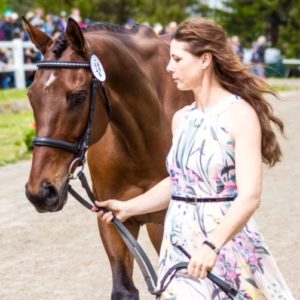 In 1973, as the director of the American Civil Liberties Union’s Women’s Rights Project, Ruth Bader Ginsburg won the first gender equality case that she argued in front of the Supreme Court.
In 1973, as the director of the American Civil Liberties Union’s Women’s Rights Project, Ruth Bader Ginsburg won the first gender equality case that she argued in front of the Supreme Court.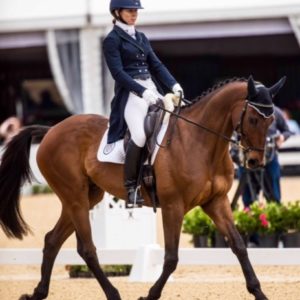 Last month, as a professional female athlete in one of only a few mixed gender Olympic level sports, Tactical Maneuver (Gucci) and I completed our second CCI4* at the Land Rover Kentucky CCI4* in Lexington. The weekend was gorgeous. We had rain early in the week, but then the sun came out and the springtime Kentucky grass drank up the water to provide some of the nicest footing we ever get to run on. This time at Kentucky the weekend had a different feel than our debut at the level in 2016. Gucci has matured, and our partnership has solidified even more after seven cumulative years together. We both knew what we needed to do.
Last month, as a professional female athlete in one of only a few mixed gender Olympic level sports, Tactical Maneuver (Gucci) and I completed our second CCI4* at the Land Rover Kentucky CCI4* in Lexington. The weekend was gorgeous. We had rain early in the week, but then the sun came out and the springtime Kentucky grass drank up the water to provide some of the nicest footing we ever get to run on. This time at Kentucky the weekend had a different feel than our debut at the level in 2016. Gucci has matured, and our partnership has solidified even more after seven cumulative years together. We both knew what we needed to do. A few weeks before Kentucky, I was helping one of my kids at a horse trials in Ocala, FL.
A few weeks before Kentucky, I was helping one of my kids at a horse trials in Ocala, FL.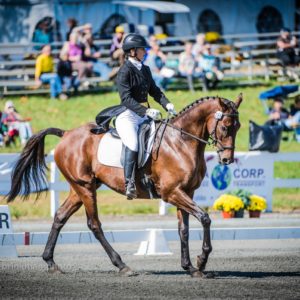
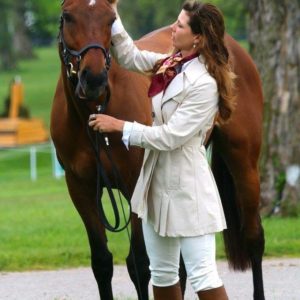


 Sometimes in life, all of the puzzle pieces seem to magically fall together in one wonderful moment or sequence of moments and amazing results occur. More often, however, we must polish our pearls. Pearls are created when a grain of rough sand becomes embedded in the interior mantle of an oyster, causing the oyster irritation. The oyster then deposits calcium carbonate in iridescent, concentric layers to smooth the rough edges of the grain of sand. Over time the pearl grows, with each layer creating more depth and luster, and making the end product more beautiful.
Sometimes in life, all of the puzzle pieces seem to magically fall together in one wonderful moment or sequence of moments and amazing results occur. More often, however, we must polish our pearls. Pearls are created when a grain of rough sand becomes embedded in the interior mantle of an oyster, causing the oyster irritation. The oyster then deposits calcium carbonate in iridescent, concentric layers to smooth the rough edges of the grain of sand. Over time the pearl grows, with each layer creating more depth and luster, and making the end product more beautiful.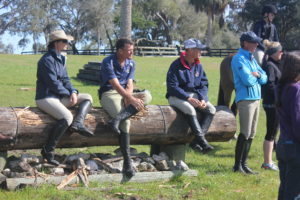 I taught my first riding lesson when I was fourteen at a Pony Club clinic. To be able to move up to my next rating in the Pony Club system, I needed to know how to teach. Richard Lamb, who is still active in the United States Pony Club (USPC) today, was the clinician. I was absolutely horrible. I don’t remember what I taught, but I do remember being nervous and having no idea what to say to the little girl I was supposed to help. I knew I was bad. In the weeks and months that followed my mom encouraged me, and the necessity of needing to learn to teach for the sake of my rating made me press on. By the time I was sixteen I was good enough that people began to pay me to teach beginner riding lessons. By the time I was seventeen, I had passed my “A” rating through Pony Club and was a certified instructor.
I taught my first riding lesson when I was fourteen at a Pony Club clinic. To be able to move up to my next rating in the Pony Club system, I needed to know how to teach. Richard Lamb, who is still active in the United States Pony Club (USPC) today, was the clinician. I was absolutely horrible. I don’t remember what I taught, but I do remember being nervous and having no idea what to say to the little girl I was supposed to help. I knew I was bad. In the weeks and months that followed my mom encouraged me, and the necessity of needing to learn to teach for the sake of my rating made me press on. By the time I was sixteen I was good enough that people began to pay me to teach beginner riding lessons. By the time I was seventeen, I had passed my “A” rating through Pony Club and was a certified instructor.